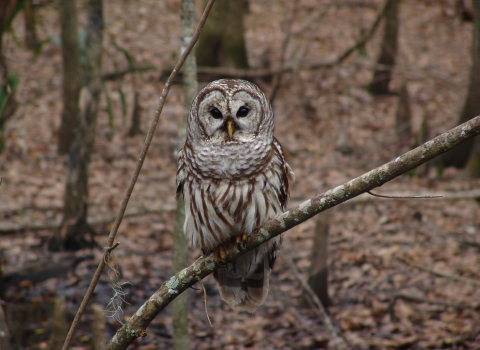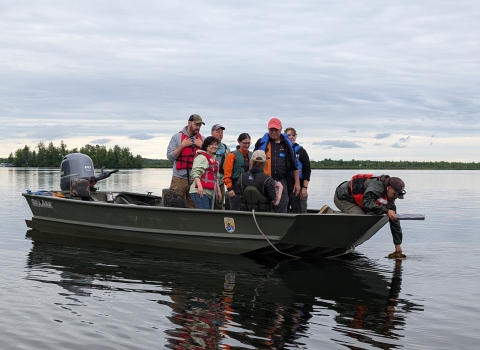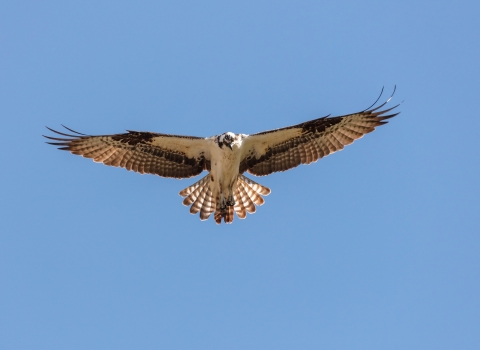WASHINGTON, DC – The U.S. Fish and Wildlife Service and Association of Zoos and Aquariums today announced that $10 million is available in American Rescue Plan Act funding for eligible zoos and aquariums. The eligibility criteria for the rescued wildlife category for funding is now expanded to include native marine mammals rescued from the wild regardless of their Endangered Species Act status. This expansion of criteria aligns with the language of the ARPA to address the care of federal trust species.
“Funding through the President’s Investing in America agenda will help the Service continue this important work with AZA to reimburse plant and animal care facilities that are important to the American public and to the Service’s mission,” said Service Director Martha Williams. “These resources will help continue our investment in efforts protecting the nation’s imperiled species.”
“Facilities that care for endangered and threatened species provide a valuable service to the federal government, often at their own expense. The pandemic was especially hard on these facilities because they continued to provide care while experiencing a dramatic decline in revenue due to being closed,” said Dan Ashe, president and chief executive officer at AZA. “We know some facilities missed their chance to receive reimbursement funds last time. We are pleased to offer a second round of funding to benefit those facilities.”
In 2021, the Service and AZA announced the ARPA-funded Endangered Species COVID-19 Relief reimbursement program. The program reimburses facilities with pandemic-related revenue losses of 25 percent or more to help cover the cost of their work to help protect endangered species. To date, 103 facilities have applied for reimbursement expenses incurred from March 2020 to May 2021, totaling over $40 million in requests.
Of the 103 applications, 93 were approved and funded for $17.4 million. Three remaining applications (totaling over $2 million) are currently undergoing AZA review and subsequent approval by the Service. The remaining applicants either withdrew their application, did not have eligible species, or did not respond to requests for information, leaving $10 million remaining for distribution.
Through ARPA, Congress recognized the dedication of zoos and aquariums to help save animals and plants from extinction by appropriating $30 million to reimburse expenses related to the care of captive species listed under the ESA, as well as rescued and confiscated wildlife. Funding is provided by the Service to AZA to execute this program. AZA is responsible for the overall administration and oversight of the funds, but eligible facilities do not have to be AZA-accredited or AZA-certified to receive these animal care-related reimbursements.
Zoos, aquariums, and other facilities work alongside the federal government to support recovery programs, rehabilitate injured animals, and help save endangered species from extinction, including manatees, sea turtles, black-footed ferrets, California condors, Florida corals, Mexican wolves, red wolves, southern sea otters, and many others.
Funds will be directed toward reimbursing eligible facilities for the care of:
- U.S. native captive plant and animal species listed under the ESA.
- U.S. native animal species listed under the ESA that were rescued from the wild and U.S. native marine mammals rescued from the wild regardless of ESA status.
- Animal species listed under the ESA and/or in the Appendices of the Convention on International Trade in Endangered Species of Wild Fauna and Flora confiscated by the U.S. government at, or destined for, U.S. ports and borders and held in animal care facilities.
Priority for reimbursement will be given to those facilities that have not applied previously. Those requests are capped at $1 million per eligible facility. If funds remain, applicants who have received reimbursement funds previously but have not hit the $1 million cap can submit an additional request and will be considered, followed by those applicants whose request exceeds the $1 million cap.
Applicants may submit funding requests for all or some of this time period, provided the period is for a minimum of six consecutive months. Applicants must also certify that other direct federal financial aid did not cover allowable expenses. Reimbursable expenses can include the following:
- Food.
- Veterinary care/medicine.
- Direct animal/plant care staff time.
- Life-support systems.
- Transport for medical, reintroduction into the wild, and captive breeding purposes.
- Real property debt and holding space improvements/modifications.
- Utilities essential for the care of species (e.g., electricity/gas/natural gas to power essential services).
Eligible facilities can find more information about applying for the second round of reimbursements and other application resources at aza.org/endangered-species-COVID-funding.
Today’s announcement comes as the ESA turns 50 years old in 2023. Throughout the year, the Department of the Interior is celebrating the ESA's importance in preventing imperiled species' extinction, promoting the recovery of wildlife and conserving the habitats upon which they depend.
The ESA has been highly effective and credited with saving 99% of listed species from extinction. Thus far, more than 100 species of plants and animals have been delisted based on recovery or reclassified from endangered to threatened based on improved conservation status, and hundreds more species are stable or improving thanks to the collaborative actions of Tribes, federal agencies, state and local governments, conservation organizations and private citizens.
-FWS-
The U.S. Fish and Wildlife Service works with others to conserve, protect and enhance fish, wildlife, plants and their habitats for the continuing benefit of the American people. For more information, visit www.fws.gov and connect with us on social media: Facebook, Instagram, Twitter, LinkedIn, Flickr and YouTube.



